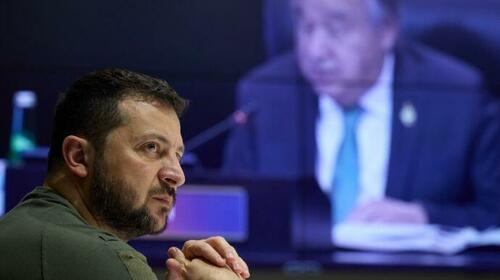
January 14, 2023
1. Russia reacts negatively to Turkish support of Zelensky’s ‘peace plan’
Turkey’s stated support of the “so-called peace plan” formulated by Ukrainian President Zelensky does not change the fact that Russia considers it unacceptable, Russian Foreign Ministry said on January 11.
The ‘peace plan’ was presented by Zelensky at the G 20 Summit in Bali, Indonesia, last November. It involves a full Russian withdrawal from territories that Kiev considers to be its own and long-term support of Ukraine by international donors. Such and other paragraphs are not acceptable to Moscow.
Russian Foreign Minister Sergey Lavrov, who represented Russia at the gathering in Bali, called Zelensky’s virtual address “militant, Russophobic and aggressive” and dismissed his ten-point agenda as “unrealistic and inadequate.”
The Kremlin called such proposals a non-starter, insisting that if Ukraine wants peace it should take into account “the new realities,” referring to the four former Ukrainian regions that voted to join Russia last fall, after Crimea did the same in 2014 following a coup in Kiev.
If resumed, the talks between Russia and Ukraine will most likely be direct, without mediators, which would be the best option, Alexey Polishchuk, director of the Russian Foreign Ministry's Second CIS Department monitoring Ukraine, said in an interview with TASS.
The diplomat noted that last year’s talks with the Ukrainian side were direct. "Until now we have only interacted with the Ukrainians directly, using the platforms that were kindly provided to us, which we really appreciate. Three rounds of the Russian-Ukrainian dialogue were held in Belarus and one in Turkey in February-April of last year. Later almost daily contacts were held via video link. Those were direct talks with the Ukrainians," he emphasized.
2. Last year the number of forcible seizures of churches belonging to Ukrainian Orthodox Church (UOC) has increased almost 20-fold
The Ukrainian authorities intensified their policy of hostility towards the canonical Ukrainian Orthodox Church (UOC), in 2022 the number of raids on its churches and illegal re-registration of parishes increased many times. In 2022, such 129 seizures of churches were recorded. This is stated in the 2022 Annual report of Metropolitan Anthony, the UOC chief administrator.
Furthermore, the report says that 74 decisions of local authorities on banning the activity of religious organizations of the UOC, 84 cases of re-registration of parishes in favor of the Orthodox Church of Ukraine (OCU), and 10 acts of vandalism have been registered.
The OCU was created by merging the two schismatic organizations in Ukraine in 2018, at the initiative of former Ukrainian President Petro Poroshenko and Patriarch Bartholomew.
It was also noted in the 2022 Report that "artificially intensified religious hatred towards the UOC", "representatives of other confessions <...>, abusing their positions of power and authority, make illegal and unfounded accusations against the UOC", "violations of the rights of believers of the UOC continue" and their feelings are insulted.
The manager of the church affairs drew attention to the fact that on December 9, 2022 the Committee on Humanitarian and Information Policy submitted four anti-church bills to the Verkhovna Rada or Parliament of Ukraine.
"All of them, without exception, are directed against the UOC, violate the rights and freedoms of believers and are aimed at restricting the rights and liquidating religious organizations belonging to the UOC," the Metropolitan said. According to him, these laws, as anti-constitutional, should be removed from the agenda and should not be put to a vote in the Rada.
The Ukrainian Orthodox Church's Synodal Legal Department previously stated that the draft laws violate the rights of believers of the canonical church and are aimed at its liquidation. According to the lawyers, the bills simplify the transition of the UOC communities into subordination of the so-called Orthodox Church of Ukraine (OCU), create preconditions for raiding of churches and monasteries, including the Pochayiv and Kyiv-Pechersk lurches, and are aimed at a complete ban on the UOC.
In recent months, the Ukrainian authorities have stepped up their actions against the canonical Ukrainian Orthodox Church. The SBU or Security Service of Ukraine has been conducting searches in UOC churches, and several hierarchs have been charged with treason and subversion. On December 1, 2022 Ukrainian President Zelensky issued a decree that enacted a decision of the National Security and Defense Council of Ukraine, which, in fact, was aimed at banning the UOC. In particular, the decree instructed to introduce to the parliament a bill to ban religious organizations affiliated with the centers of influence in the Russian Federation.
By decrees of Zelenskyy of December 1 and 11, 2022 sanctions were introduced against 17 representatives of the UOC, including archbishops, metropolitans, and vicars of monasteries.
[source: https://tass.ru/obschestvo/16691353]
So, various democratic freedoms in Ukraine have been banned a long time ago by pro-western Ukrainian leaders. Now, they say, the time has come to limit and to ban religious beliefs.
Despite this: no response from the Pope, no response from NATO and the EU states on all these undemocratic phenomena.
Written by Vladimir P. Kozin



